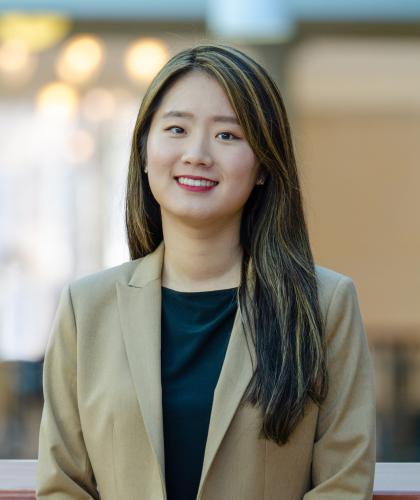
Survivor Advocacy Program welcomes Yejin Sohn as new advocate and case manager

In January, Ohio University’s Survivor Advocacy Program (SAP) welcomed Yejin Sohn, MSW, LSW, as a new survivor advocate and case manager.
Sohn joins the team as OHIO continues to promote resources to students who have experienced sexual and interpersonal violence and adds unique expertise in working with international survivors.
Sohn grew up in South Korea and has been interested in working with survivors of interpersonal violence since high school, where she started managing a student group for preventing sexual violence and helping survivors.
While at Sungkyunkwan University, one of the top three universities in South Korea, Sohn studied social work and psychology and ultimately received a master’s in social work. In 2019, she earned a second master’s in social work from Washington University in St. Louis, Missouri.
During her time at Washington University, Sohn was a practicum student at the school’s Relationship and Sexual Violence Prevention Center. She enjoyed working with college students and said it was rewarding to make international students feel included and help them understand their resources. Sohn decided she wanted to continue working with young adults and found that OHIO and SAP were a good fit.
Students of all identities and nationalities are welcomed to work with Sohn, but she brings a unique perspective to SAP since she also understands the challenges that international survivors face.
“We have been interested in exploring ways to better reach and serve our international student population so it was an added bonus that [Sohn] had this experience,” said Kim Castor, the director of SAP. “We know that international students often have unique experiences and needs, and we want to be able to serve them in the most competent and respectful manner. There are international student survivors on our campus that have never heard of SAP, so we wanted to find ways to reach those survivors and let them know that we are here for them.”
Sohn said that in addition to the challenges discussing traumatic events poses, international survivors may be communicating in a non-native language and may have a different cultural response than a survivor from the United States. She is ready to learn about new cultures and listen to students’ diverse perspectives and find ways to support and assist them in their healing journey.
Sohn believes that her Korean identity will help her in her new position because it lets her “understand the diverse population and make them feel more comfortable to talk about their own cultural backgrounds.”
She has seen a large difference between how people in the United States versus those in Korea talk about sexual violence.
Sohn said that in her opinion, survivors in Korea often have a difficult time asking for help after an assault because there is stigma both around experiencing sexual violence and also around talking about emotions or getting help for mental health. These intense stigmas can delay a survivor from accessing resources and processing potential trauma.
To international students who are survivors of sexual and interpersonal violence, Sohn said, “I understand the difficulty and the worries you have now. But if that is the reason why you hesitate to get services from us, I promise that sometimes the wound can be healed when you share with someone who cares about you, and I hope that person can be me and our advocates in this office.”
In addition to her professional work, Sohn is interested in becoming part of the Athens and international student communities.
“I am here as an advocate for student survivors, but also if there is anyone who wants to talk about Korea or living as an international student in this country, I am more than happy to talk with them. I would like to learn how I can be [a resource] for everyone on this campus,” Sohn said.
The Survivor Advocacy Program provides confidential services to all student survivors and co-survivors at Ohio University, regardless of nationality, gender identity, sexual orientation or when/where victimization occurred. To meet with an advocate, you can call their 24-hour hotline at (740)-597-7233, email survivor.advocacy@ohio.edu or visit their office in Lindley Hall 038 Monday to Friday from 9 a.m. to 5 p.m.
